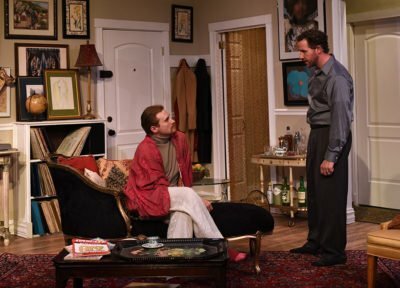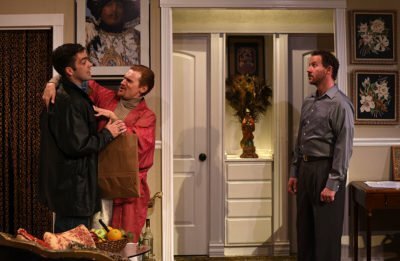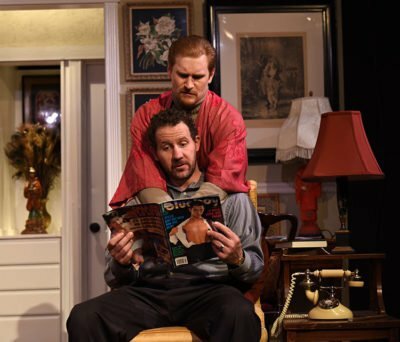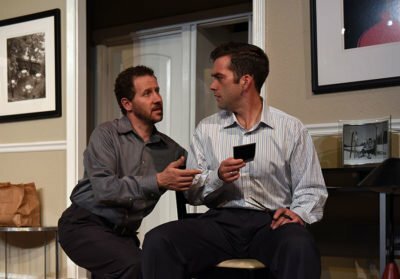The Lisbon Traviata
 By Terrence McNally
By Terrence McNally
Directed by Steve Scott
Produced by Eclipse Theatre Company
Playing at the Athenaeum Theatre, Chicago
Moderation the Key to a Healthy Relationship with Opera
Eclipse Theatre’s season dedicated to Terrence McNally has included plays from only a four-year span of his half-century long career. But in doing so, they’ve maintained a unity of theme, and The Lisbon Traviata is a brilliant capstone to a year which saw revivals of McNally’s character dramas which are set against the backdrop of the AIDS crises. While the position of gay people in America has changed much since The Lisbon Traviata’s debut in 1989, McNally’s talent for capturing loneliness, jealousy, and self-delusion remain as timeless as ever. But the play is more than a sob-story, it is also a piece which helped establish McNally’s interest in opera, and contains one of his funniest characters. Under the direction of Steve Scott, this production is a fine tribute to one of America’s greatest living playwrights.

The play opens in the home of Mendy (JP Pierson), a flamboyantly fanatical devotee of the opera diva Maria Callas (who McNally later wrote The Master Class about). Mendy is making up for lost time; he was married, is now on good relations with his ex and son, but has never had a romance with a man. Opera never rejects him, he says, and so he attends every performance and obtains every record he can. His friend, the publisher Stephen (Joe McCauley), is far more subdued and not totally out of the closet, but equally obsessed with opera, although not in a way that leads him to outwardly emulate Callas’s reputed behavior. It was he who introduced Mendy to opera, and as they listen to Mendy’s collection, Stephen teases his friend by revealing he is in possession of a rare pirated copy of a performance of La Traviata, an opera about a terminally ill courtesan, Callas gave in Lisbon.

There is a much darker undercurrent to the banter that makes up Act I, however. Stephen and his long-time partner, Mike (Joel Reitsma), have recently decided to try an open relationship. Stephen, obviously lying, claims this is not a sign they are in trouble. But he is quite bitter because he fully expects to be stood up by his much younger date this evening, while Mike is at home cavorting with the very handsome grad student Paul (Luke Daigle), who he has been seeing a bit too much of for a casual affair. Mendy finds this very frustrating, since he always loved Stephen, and even now, Stephen won’t even consider a sexual relationship with him. But when Stephen returns home in Act II, the play shifts from Wildean wit to something much darker and uglier, as obsession and desperation show their true faces, without operatic gloss.

Scott guides all four of his actors through magnificent performances. Pierson’s Mendy is the most memorable, dominating Act I with his catty snobbery and fury at the culturally ignorant. Nobody ever treats him as if he’s serious, he complains, even though he usually isn’t, and would quickly be ostracized if he were. Nobody takes his desire for companionship seriously, either, out of awareness that Mendy is determined to live in the exaggerated, but ultimately fake, world of performance, which allows him to suddenly belt out Italian arias and act out the scene in which Tosca stabs Scarpia. The skill of Scott’s directing is that Mendy is ultimately something of a decoy protagonist, but when Stephen comes more into prominence in Act II, there’s a feeling of fluidity. We’ve seen the imaginary world; now let’s see the real one.

Scenic designer Kevin Hagan’s set, and prop designer Vanessa Thomas’s furnishings, are appropriate for both Mendy and Mike and Stephen’s apartments, with simple, but transformative changes. Mike, a doctor, and Paul, a social worker, are in no way stupid or uncultured, but have more modern and less continental taste in art (as well as much more immediate exposure to the world and specifically gay New Yorkers’ problems). Reitsma and Daigle’s characters are both much more grounded in reality, and though passionate, don’t tend to idealize anything. McCauley’s Stephen is a study in denial. When Stephen plays mind games with Paul, he’s justifiably angry, although Daigle does an admirable job of letting Paul hold his own against McCauley’s needling. But with Mike, Stephen’s sense of denial becomes more apparent, and Retisma gains the audience’s sympathy without any sudden reversals in Mike’s characterization, although by then, Paul has reason to be suspicious of him, as well.

There are aspects of McNally’s work that are particular to 1989. Sound designer Aaron Stephenson has provided scratchy, low-quality recordings off of vinyl and cassettes for the characters to declare the most beautiful sounds ever heard. Mendy and Stephen use the AIDS epidemic to justify their reluctance to meet new people and condemn Mike for doing so, but that’s an excuse. Nonetheless, the characters are all traumatized by having spent the past nine years in fear and mourning, and Stephen admits in one monologue, which McCauley delivers with a perfect blend of righteousness and embarrassment, that his sense of empathy was exhausted a long time ago. However, the feelings resulting from the characters’ circumstances are still immediately relatable, as is their differing relationships to art, which results from how they interact with the world. Much of Act I is a list of all the operas Mendy and Stephen are fans of, which might irritate someone who is less familiar with these works, but Mendy’s put-on persona demonstrates the style of nineteenth-century romanticism, which is what is thematically relevant. Certainly knowing opera helps, but is not essential. The Lisbon Traviata depicts people of a certain time and culture, but is so masterfully written and performed, it is still powerful.
Highly Recommended
Jacob Davis
[email protected]
Reviewed November 10, 2015
This show has been Jeff recommended.
For more information, see The Lisbon Traviata’s page on Theatre in Chicago.
Playing at the Athenaeum Theatre, 2936 N Southport, Chicago. Tickets are $30; to order, call 312-902-1500 or visit eclipsetheatre.com. Performances are Thursdays-Saturdays at 7:30 pm and Sundays at 2:00 pm through December 13. Running time is two hours and ten minutes with one intermission. Show contains nudity.
